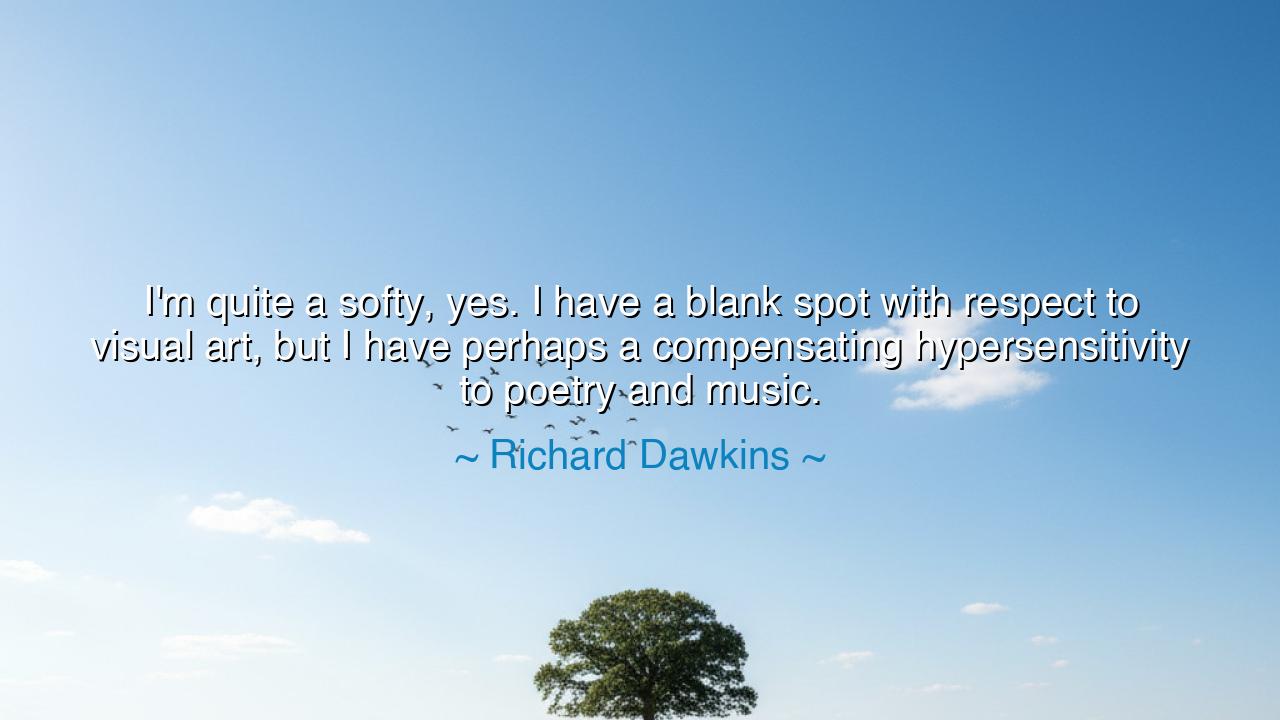
I'm quite a softy, yes. I have a blank spot with respect to
I'm quite a softy, yes. I have a blank spot with respect to visual art, but I have perhaps a compensating hypersensitivity to poetry and music.






Hear the words of Richard Dawkins, a man often known for his sharp reason and scientific clarity, yet here confessing a gentler truth: “I'm quite a softy, yes. I have a blank spot with respect to visual art, but I have perhaps a compensating hypersensitivity to poetry and music.” In these words, we glimpse the paradox of the human soul—that one may lack vision in one realm, yet burn brightly in another. He speaks of his blank spot, not with shame, but with humility, and of his hypersensitivity, not as a weakness, but as a gift.
The meaning is plain but profound: each soul carries both limits and strengths. We are not made to master every domain of beauty, nor to comprehend every expression of the human spirit. Some will find wonder in the stroke of a brush upon canvas, others in the rise of song or the rhythm of verse. Dawkins reminds us that to be human is not to grasp all things equally, but to honor the realms in which our hearts are stirred. Where one sense falters, another often awakens with greater power.
Consider the life of Ludwig van Beethoven, who in time lost his hearing, the very sense most vital to his craft. One might have thought his genius ended there. Yet his inner ear, his spiritual hypersensitivity to music, carried him through silence itself. From this seeming blank spot came symphonies that still thunder across the centuries. His story mirrors Dawkins’ admission: that limitation does not destroy us, but can become the doorway to deeper sensitivity.
So too have poets known this truth. The blind Homer, if indeed he was one man, saw nothing of the visual world, yet from his lips flowed the epics of The Iliad and The Odyssey. Sight was denied him, yet vision of another kind poured forth in words that shaped civilizations. What Dawkins describes as his compensating hypersensitivity is an ancient truth—that the human soul, when closed in one door, often flings wide another.
The lesson for us is clear: do not despair at your blank spots. Do not envy the gifts of others so much that you forget your own. Instead, search for the places where your spirit responds most deeply, whether it be in song, in words, in colors, or in silence. Respect the diversity of gifts among people, for it is by this diversity that humanity is enriched. The painter, the poet, the musician, the thinker—all together weave the great tapestry of civilization.
Dawkins also calls us to sensitivity, to open ourselves to that which moves us. In an age that prizes logic and conquest, there is wisdom in being “a softy,” in allowing poetry and music to pierce the heart. For it is in such moments that we remember we are not only minds that calculate, but souls that feel. To deny this is to live half a life. To embrace it is to know the fullness of being human.
Therefore, child of tomorrow, take this teaching into your days: honor both your limitations and your strengths. Do not scorn yourself for what you cannot grasp, but rejoice in what awakens your heart. Seek out art, poetry, and song, not to master all, but to find where your spirit comes alive. Respect the gifts of others, and share your own with humility. For the true wealth of humanity lies not in uniform perfection, but in the harmony of many voices, each strong in its own way.
Thus the words of Richard Dawkins endure, soft yet wise: “I have a blank spot … but a hypersensitivity to poetry and music.” Let them remind you that even the most rational mind needs beauty, that every soul is shaped by both absence and abundance, and that in embracing this balance, you too may find your unique place in the great chorus of life.






AAdministratorAdministrator
Welcome, honored guests. Please leave a comment, we will respond soon